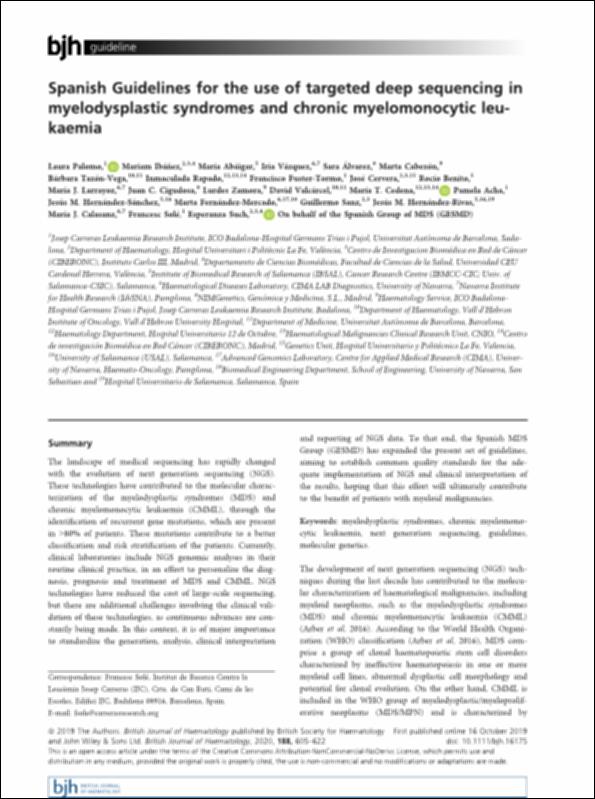Por favor, use este identificador para citar o enlazar este ítem:
http://hdl.handle.net/10637/10780Spanish Guidelines for the use of targeted deep sequencing in myelodysplastic syndromes and chronic myelomonocytic leukaemia
| Título : | Spanish Guidelines for the use of targeted deep sequencing in myelodysplastic syndromes and chronic myelomonocytic leukaemia |
| Autor : | Palomo Sanchis, Laura Ibáñez Company, Mariam Abáigar Alvarado, María Vázquez, Iria Álvarez de Andrés, Sara Cabezón, Marta Such Taboada, Esperanza |
| Materias: | Medula ósea - Tumores.; Síndrome mielodisplásico.; Myelodysplastic syndrome.; Chronic myelomonocytic leukemia.; Hematology.; Hematología.; Bone marrow - Tumors.; Genética molecular.; Molecular genetics.; Leucemia mielomonocítica crónica. |
| Editorial : | John Wiley & Sons : British Society for Haematology |
| Citación : | Palomo, L., Ibáñez, M., Abáigar, M., Vázquez, I., Álvarez, S., Cabezón, M. et al. (2020). Spanish Guidelines for the use of targeted deep sequencing in myelodysplastic syndromes and chronic myelomonocytic leukaemia. British Journal of Haematology, vol. 188, n. 5 (mar.), pp. 605-622. DOI: https://doi.org/10.1111/bjh.16175 |
| Resumen : | The landscape of medical sequencing has rapidly changed with the evolution of next generation sequencing (NGS). These technologies have contributed to the molecular characterization of the myelodysplastic syndromes (MDS) and chronic myelomonocytic leukaemia (CMML), through the identification of recurrent gene mutations, which are present in >80% of patients. These mutations contribute to a better classification and risk stratification of the patients. Currently, clinical laboratories include NGS genomic analyses in their routine clinical practice, in an effort to personalize the diagnosis, prognosis and treatment of MDS and CMML. NGS technologies have reduced the cost of large-scale sequencing, but there are additional challenges involving the clinical validation of these technologies, as continuous advances are constantly being made. In this context, it is of major importance to standardize the generation, analysis, clinical interpretation and reporting of NGS data. To that end, the Spanish MDS Group (GESMD) has expanded the present set of guidelines, aiming to establish common quality standards for the adequate implementation of NGS and clinical interpretation of the results, hoping that this effort will ultimately contribute to the benefit of patients with myeloid malignancies. |
| Descripción : | Este artículo se encuentra disponible en la página web de la revista en la siguiente URL: https://onlinelibrary.wiley.com/doi/full/10.1111/bjh.16175 |
| URI : | http://hdl.handle.net/10637/10780 |
| Derechos: | http://creativecommons.org/licenses/by-nc-nd/4.0/deed.es |
| ISSN : | 0007-1048 1365-2141 (Electrónico) |
| Fecha de publicación : | 5-mar-2020 |
| Centro : | Universidad Cardenal Herrera-CEU |
| Aparece en las colecciones: | Dpto. Ciencias Biomédicas |
Los ítems de DSpace están protegidos por copyright, con todos los derechos reservados, a menos que se indique lo contrario.


